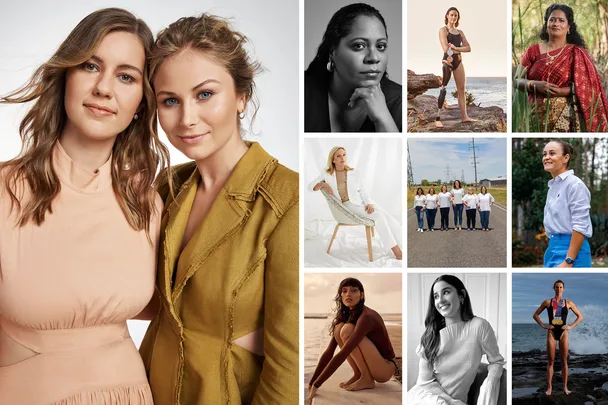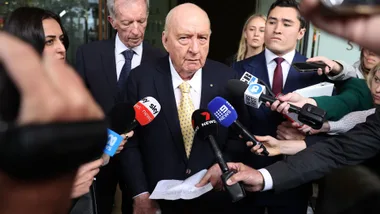For 26 years, marie claire Australia has championed women in all their glory. This month, in a special December issue, we celebrate the women who have fought with passion, led with bravery and inspired with their triumphs in 2021.
In the 10-page ‘Women of the Year’ portfolio we honour nine women – and the everyday activists of Biloela – who have risen to the challenge in 2021. In a year that was defined by political hypocrisy and ongoing lockdowns, they have fought with passion, led with bravery and inspired with their triumphs.
A round of applause for our Women of the Year!
Grace Tame
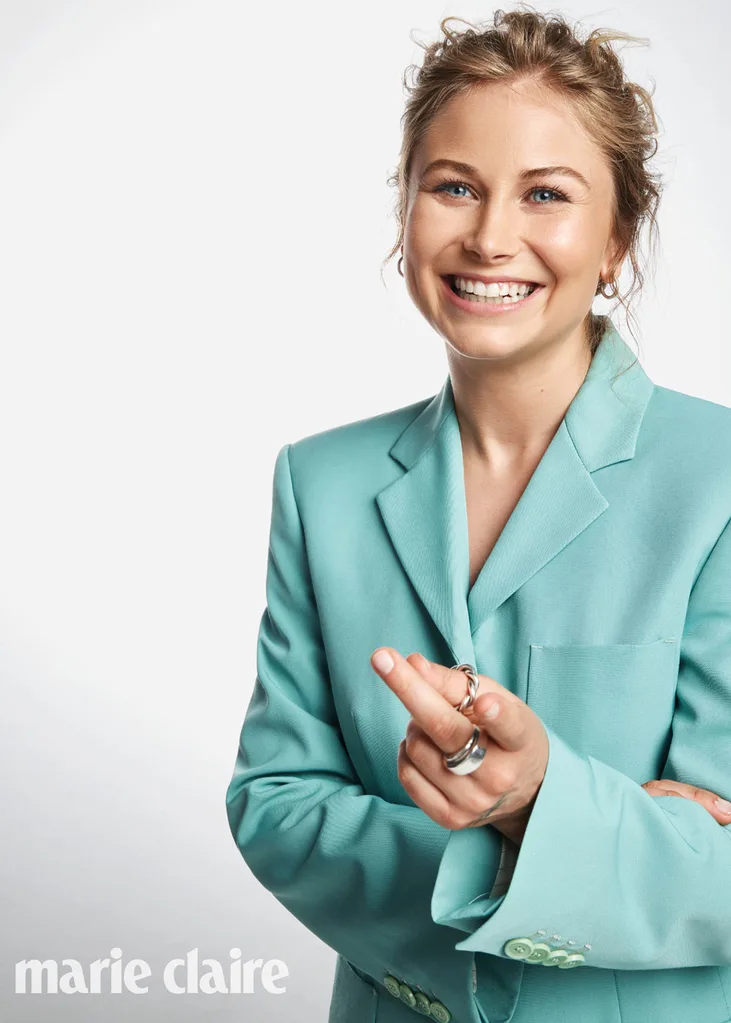
Ask Grace Tame to sum up 2021 and the Australian of the Year’s initial response is typically candid and unapologetic: “I. Am. Tired.” And no wonder. Since her impassioned acceptance speech captured the attention of the nation on January 25, the advocate for survivors of child sexual assault has become a powerhouse of progress, her stance igniting a reckoning for the women of Australia. Just don’t expect her to take any credit for it.
While acknowledging the “seismic shift in the conversation” on sexual abuse, Tame insists she is “just one domino” in the contribution. “I stand on the shoulders of giants,” she says. “Brittany Higgins, Chanel Contos, Julia Banks and Christine Holgate are all women who’ve bravely stood up against abuse culture in all its forms. And there are so many unsung heroes. I share all my achievements with a huge collective.”
While her tenure as Australian of the Year is drawing to a close – a shift she says will provide relief – the fight is far from over for Tame, who hopes to overhaul legislation and education on child sexual abuse when she sets up the Grace Tame Foundation in 2022. Meanwhile, her legacy as one of the most profound and proactive recipients of the award will endure. “I think I started the year with a lot of naivety, and I’ve realised that it’s dirty out there,” she concedes. “But I’ve also learnt that one of the most important things about being an effective leader is knowing when to admit weakness and error, because there’s great strength in [that]. You have to know the difference between having power and empowering.”
Brittany Higgins
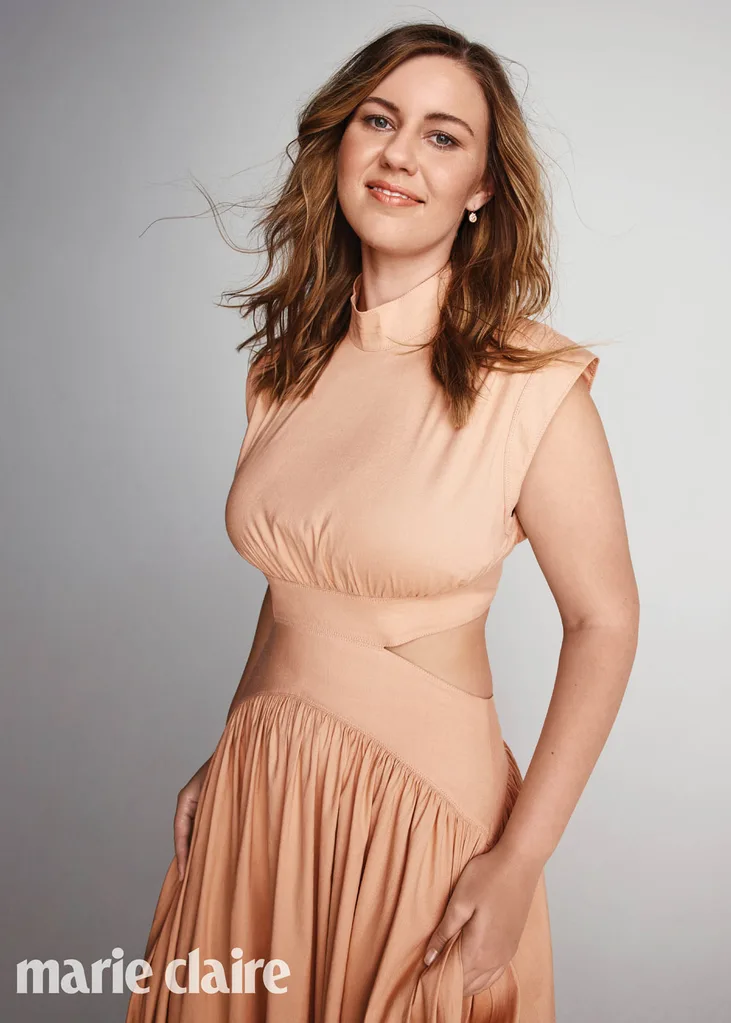
Brittany Higgins will never forget the year that was. And history won’t forget her. The former Liberal staffer will forever be synonymous with sparking a furious debate on gender-based violence following her brave decision to publicly allege she was raped by a colleague inside Parliament House.
And while it’s been a year riddled with anguish and anxiety, it has also been one of immense personal growth for Higgins, ultimately leaving her empowered by her ability to demand change and encourage countless others to do the same. “Going back to Canberra – and specifically Parliament House – to speak at the March4Justice rally was extremely difficult, but I’m so glad I did it,” says Higgins, naming the emotionally charged March 15 protest as her year highlight. “There is a devastating banality of sexual violence in our community. The truth is most women have a story like mine or know somebody with a story like mine. March4Justice was a cathartic moment for women across the country to feel heard, and being afforded the opportunity to stand with so many wonderful people and say ‘enough is enough’ will forever be a moment in my life that I’ll treasure.”
Her status as a change-maker became official in October, when she was appointed the inaugural visiting fellow of the Global Institute for Women’s Leadership, established by former prime minister Julia Gillard. Naming her position a “privilege”, Higgins believes there is still much to be done to improve workplace gender equality, starting with the government embracing the moment of change created by 2021’s national reckoning. “Cultural change comes from the top down,” she says. “If the leadership of this country takes the issue seriously, I think it’s more likely to be taken seriously by businesses across the country.” Her ongoing objective is clear: “I encourage women to feel empowered to speak up, call out bad behaviour and share your truth with the confidence of knowing you have a generation of women ready, willing and able to support you.”
Chanel Contos
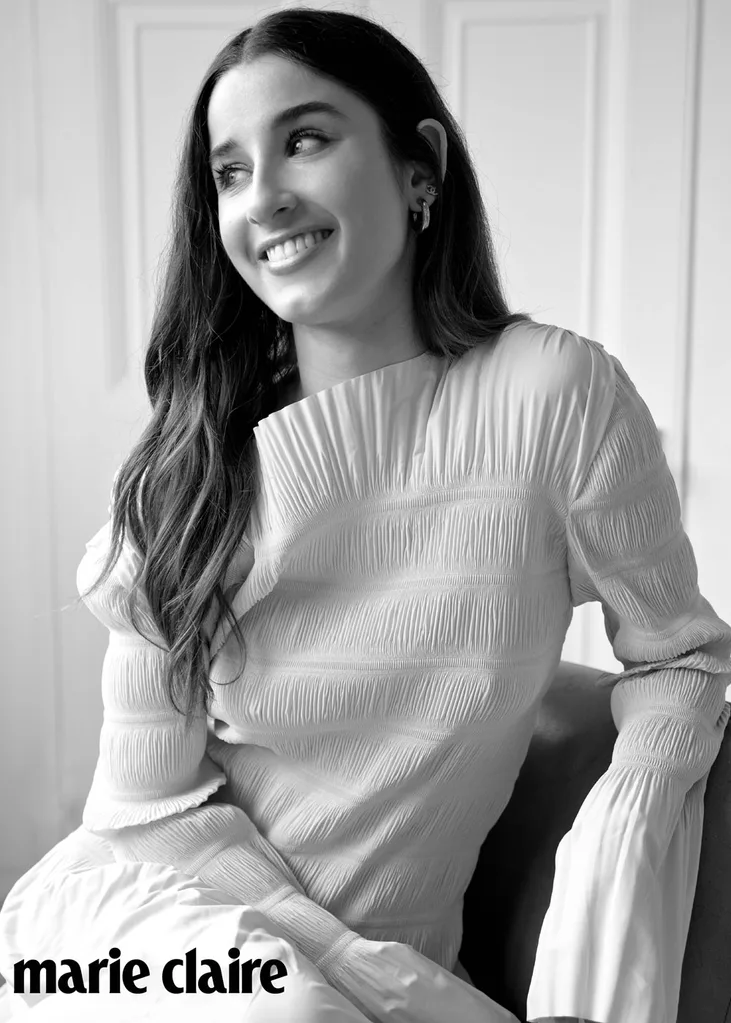
Chanel Contos may have started the year as an everyday university student but she’s ending it as someone who has the likes of Julia Gillard on speed dial, and holds her own among Australia’s top policy-makers. “The New York Times wanted to come and I had to tell them no,” she says with a laugh, recalling a recent round-table discussion she held, calling for Australia’s education system to reform how it teaches sexual consent.
In February, the former Sydney schoolgirl, 23, made global headlines when she went public with her story of teenage sexual assault and launched a petition calling on the government to overhaul sexual-consent education in Australia. To date, there have been more than 44,000 signatures and more than 6700 people have shared their testimonies – many of which first landed in Contos’ personal inbox. “I’ve stopped reading them,” says Contos, for whom the toll has been immense. “We now have an amazing team of volunteers who help.”
Their work isn’t in vain. Because of Contos and her team at Teach Us Consent, the organisation she has since founded, the national curriculum is under review and likely to be amended to include “holistic consent education”. However, Contos’ proudest achievement is far more humble: “Thousands of people trusted me with their stories. They are anonymous now, but they weren’t anonymous to me.”
Christine Holgate
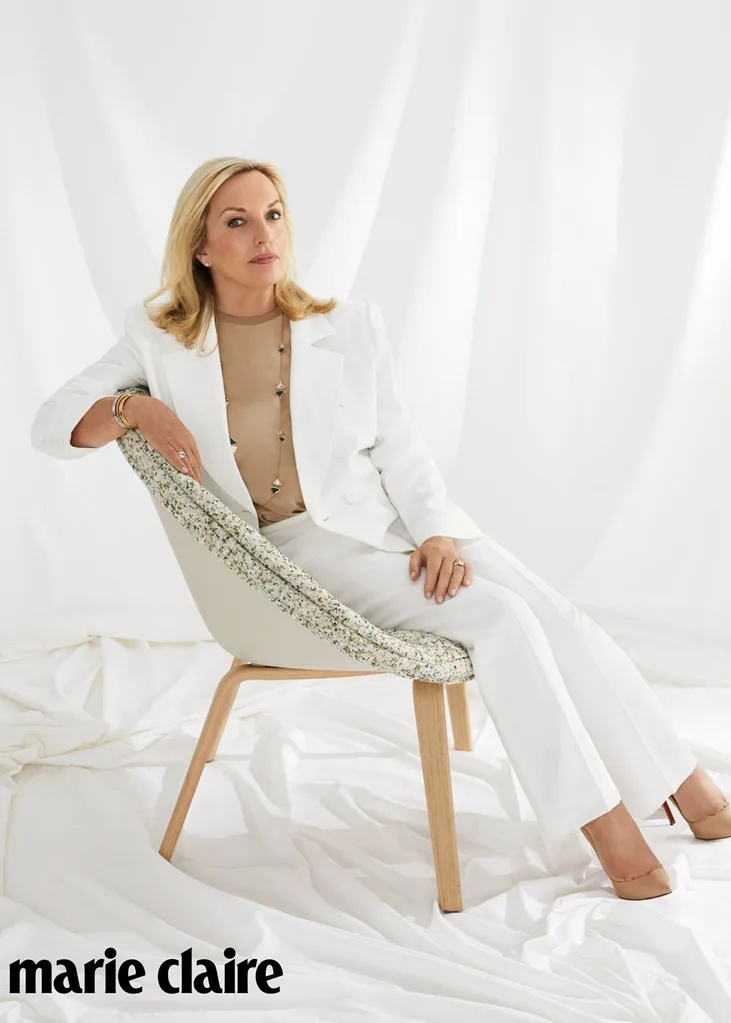
On April 14, former Australia Post CEO Christine Holgate was inundated with so many thousands of messages of support that her inbox crashed. Most were from people she didn’t know, people who had seen Holgate give evidence at a Senate inquiry the day prior, where she defended her decision to gift four executives Cartier watches.
Admirably, Holgate used the inquiry as a platform to speak out about the bullying that forced her out of her job in November 2020, when Prime Minister Scott Morrison expressed outrage in parliament over Holgate’s “appalling” and “disgraceful” decision to gift the watches – even though she had authority to award executive bonuses and had increased Australia Post’s profits. “Receiving all those messages was the moment I realised how important it was that I spoke out,” says Holgate, who believes sexism is being perpetuated at the top level. “It was not just for me, but for so many other people who haven’t been able to speak up.”
While she was left suicidal by the humiliation she endured from the ordeal and subsequent media commentary, Holgate’s brave stance has inspired her to invest in tackling the issue of workplace bullying and mental health. It’s also enabled her to forge strong bonds with other women who have spoken truth to power this year, namely Grace Tame, Brittany Higgins and Julia Banks. “This year all four of us, for very different reasons, have stood up and spoken out,” explains Holgate of the group, who catch up regularly over Zoom. “We come from different careers, separate backgrounds but we’re all absolutely united – we love Australia and just want it to be safer.”
Her biggest takeaway from 2021 will help define the rest of her life: “I learnt that women are stronger than we’re given credit for,” says Holgate, now CEO of Toll Global Express. “And yet we’re painted as not being equal. They underrate us.”
Charlee Fraser
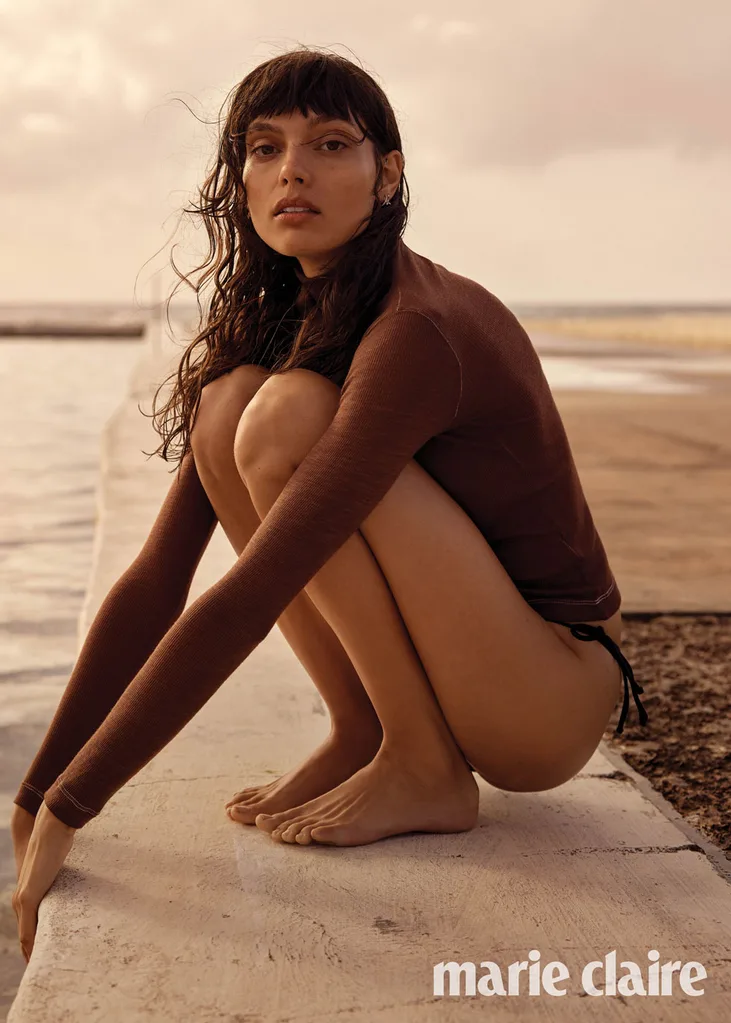
Charlee Fraser may be the model of the moment, but that doesn’t mean she’s going anywhere anytime soon. The proud Awabakal woman has steadily built a career extending beyond the fashion industry she entered as an 18-year-old, having been scouted in her home town of Newcastle. While she’s walked for all of the major fashion houses – Dior and Chanel among them – she mostly swapped the runway for the front row at this year’s Australian Fashion Week (AFW) as she launched her campaign, Not Just Trending. For the duration of the week, Fraser wore only sustainable and Indigenous designers, reusable items and vintage/second-hand garments, platforming the changes that need to be made in order for fashion to move to a more sustainable future. “The drive for looking into sustainable fashion is that it directly aligns with my culture and this really strong connection to the land,” she said.
Fraser, 25, has also cemented her status as a leader in Indigenous representation. A show she consciously chose to appear in and support was First Nations Fashion + Design (FNFD), which featured a line-up of First Nations designers, models, production and back-of-house team. “One of the reasons I decided not to walk for AFW, apart from the FNFD show, was to give that space to new Indigenous models,” explained Fraser, who also serves as a mentor for the organisation. “It is about connecting with each other, connecting with ourselves and connecting with our culture.”
Shareena Clanton
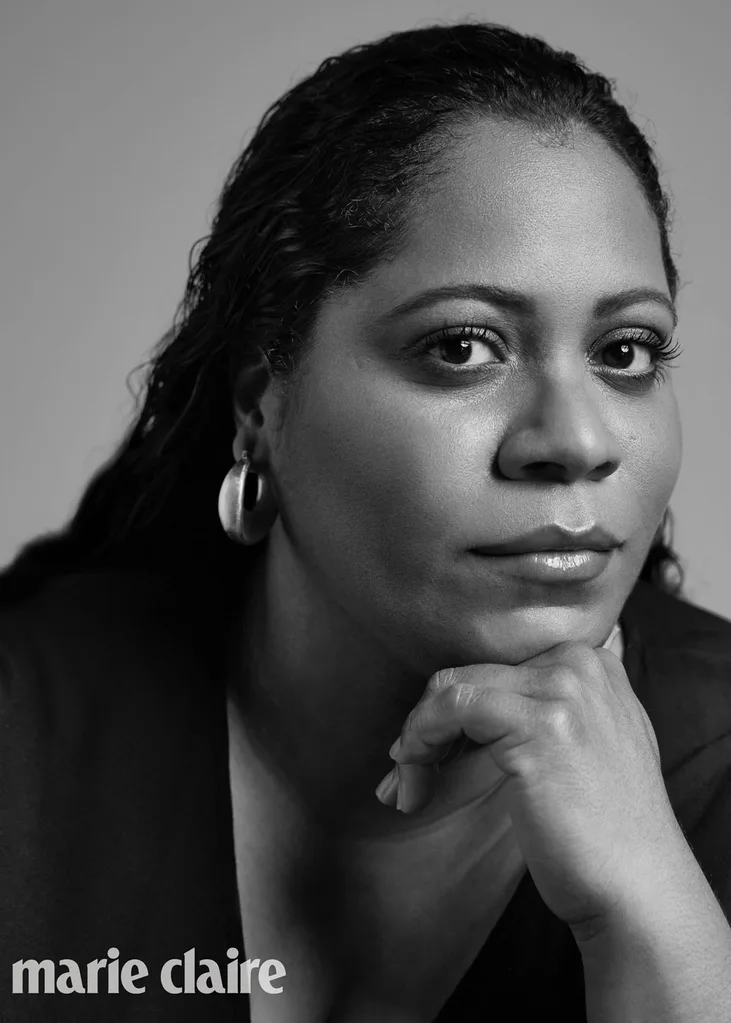
“I was prepared to surrender to the idea I may never work again,” says actor Shareena Clanton of the 24 hours that followed her decision to call out a culture of racism on the set of iconic Australian soap Neighbours. Clanton – a Melbourne-based actor of Wangatha, Yamatji, Noongar and Gidja descent, who was hired for a guest role on the series in October 2020 – detailed behind-the-scenes allegations in a social media post, saying an actor openly and repeatedly used the “n” word, while another called an actor of colour a “lil monkey”. She went on to describe the set as a “lonely, triggering and traumatising” place to work.
“I felt that by using social media as a tool to amplify my voice, I could help make it a little less overwhelming and frightening for others to share their experiences,” she says of her decision to speak out in April. “The undeniable levels of racism, fear and general ignorance that exists in our Australian film and television marketplace can no longer be swept aside.”
Within hours of her post, fellow Indigenous actor Meyne Wyatt also shared his experiences of racism on Neighbours, as did a further ensemble of actors, writers and directors of colour. Their voices prompted Fremantle Media, the producer of Neighbours, to announce an independent review into racism. “No space is exempt from critical racial and gender discourse,” says Clanton. “That space, protected and insulated for over 35 years, needed a reckoning.”
Emma McKeon
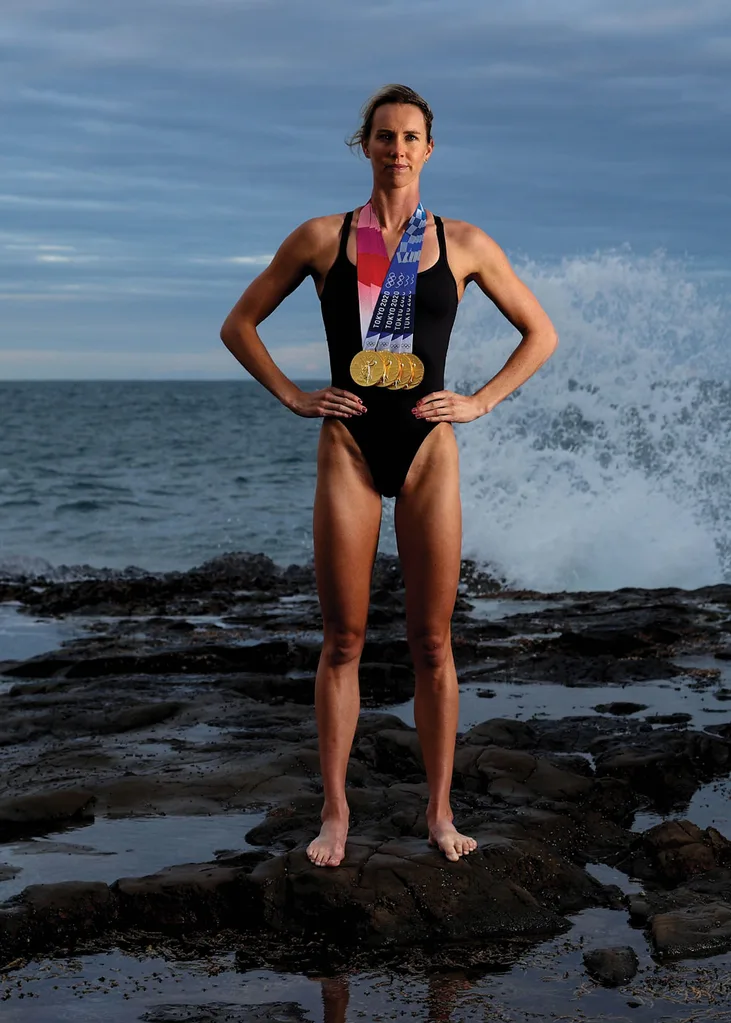
It was a Wednesday afternoon in January when Emma McKeon decided she wanted to get a tattoo. She’d finished training for the day and felt the urge to do the thing she’d been putting off for while: have the five Olympic rings inked on her wrist. She didn’t know then that seven months later she’d become the most decorated Australian Olympian. Ever. “At that point, I wasn’t sure if the Olympics were going to go ahead or not,” the 27-year-old explains. “I’d always wanted to get it since Rio [in 2016], so I just did it.”
This kind of blunt tenacity is trademark McKeon. She needn’t bother with embellishment, letting her hard work speak for itself. At the Tokyo Olympics, the Wollongong-born swimmer competed in seven events and came away with a medal for every one, including four golds, making her the first female swimmer to be the top medallist at an Olympic Games. When added to the four medals she won at the games in Rio de Janeiro, her performance at Tokyo saw her become Australia’s most decorated Olympian. “It was overwhelming to see that I was racing every day in every session. But I knew that I was prepared,” she recalls of how she approached the games.
McKeon is endlessly humble about her success. She wasn’t even aware she’d become the most decorated Australian Olympian until a journalist asked her about it in an interview. As for what’s next, she says simply, “Just doing things that genuinely make me happy and being around people who I love.” We’d say she’s more than deserved that.
Ellie Cole
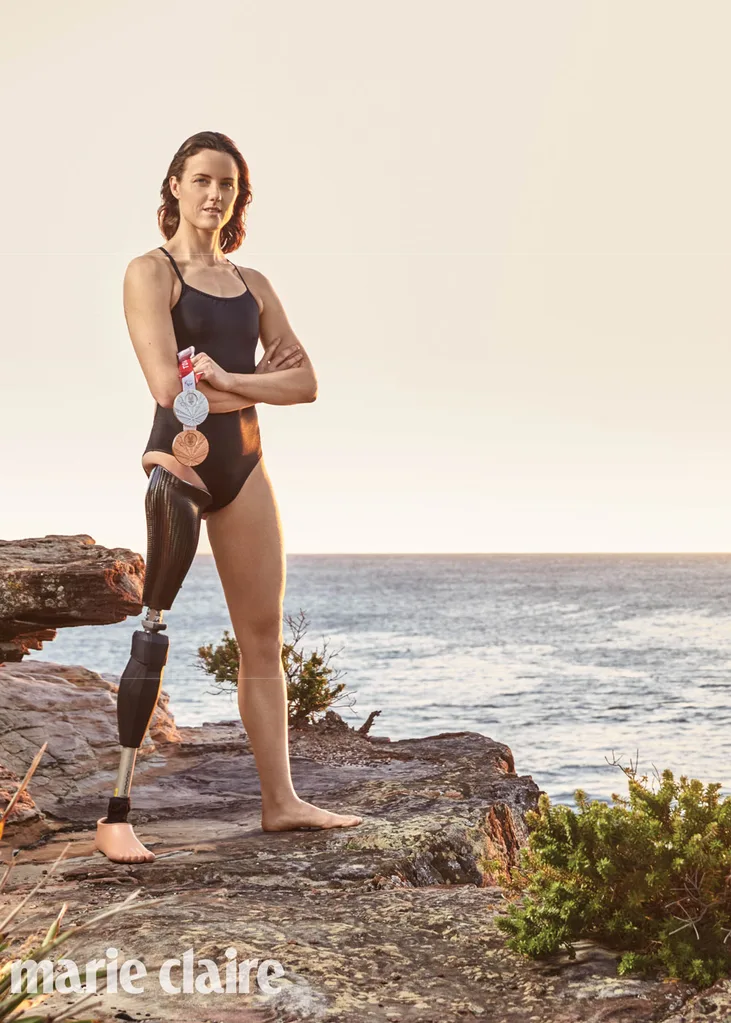
As a six-year-old, Ellie Cole was often giving her mother small heart attacks. Blissfully unaware of the potential danger, Cole would dive into the waves off Melbourne’s Mornington Peninsula and swim to the far-out buoy, challenging herself to go further and further each time. “Mum hated it,” Cole recalls with an easy laugh. Those early days of ocean swimming were just a sign of what was to come: a life of overcoming obstacles and defying expectations.
At age two, Cole was diagnosed with a rare tumour and subsequently had her right leg amputated. Her mum, Jenny, enrolled her in swim classes as a form of rehabilitation. “It was also just something me and my twin sister could do together – we were always quite competitive,” she recalls. That competitiveness was what propelled her out to the buoy, and has seen Cole become one of Australia’s most impressive athletes.
She started competitive swimming at 14, went to her first Paralympic Games at 16 and her performance in Tokyo this year took her medal tally to 17 – the most of any Australian female Paralympian. “I was just thinking, ‘Holy crap, how did I end up here?’” Cole recalls of standing on the podium to receive her 17th medal.
In addition to being a legend of the pool, Cole has also been a staunch advocate for disability rights, campaigning for Paralympians to be paid the same as their Olympic counterparts. Her efforts were rewarded in September when Scott Morrison announced there would be payment parity for medal wins. “I always just assumed that no-one really cared about the Paras too much, and that’s why we weren’t getting equal pay,” she says. “But it wasn’t that they didn’t care, they just didn’t know.”
Priya Murugappan
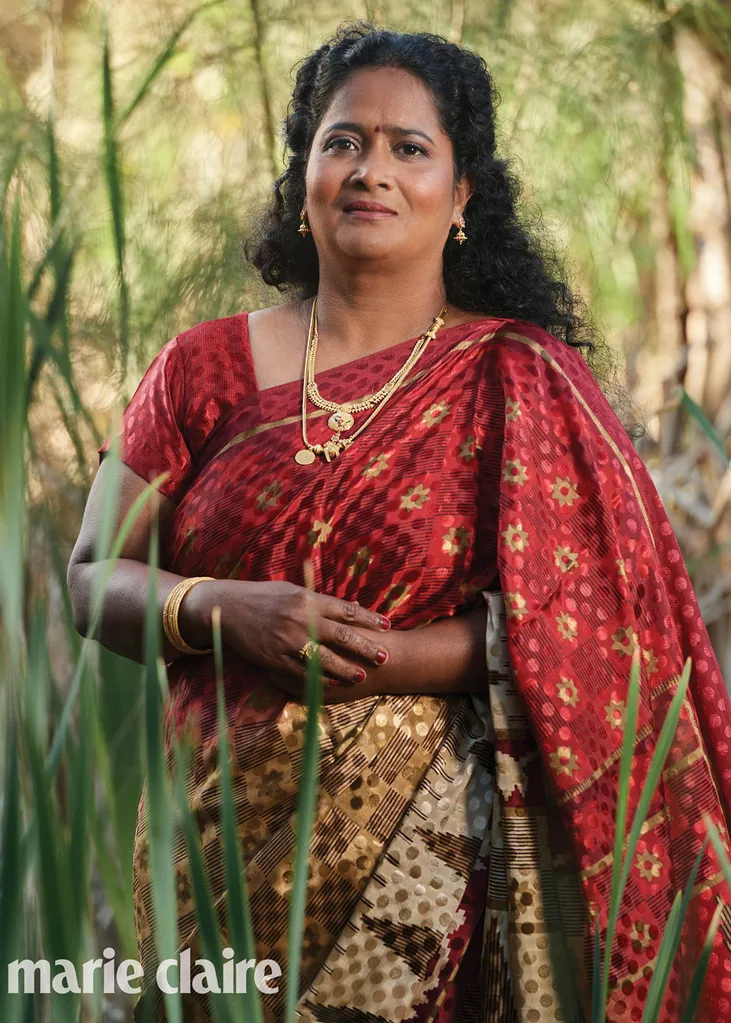
Priya Murugappan’s memories are awash with pain and persecution: of her first fiancée being burnt alive before her eyes in Sri Lanka; of being manhandled by Australian guards who ripped a tendon in her arm while forcing her onto a plane seeking to deport her; and of her youngest child nearly dying when she didn’t receive proper medical care in detention.
Yet the softly spoken mother-of-two remains composed, a pillar of strength and bravery, driven by the desire to protect her family. “I just think about keeping my daughters safe and my husband safe,” she explains.
Priya and Nades travelled to Australia by boat in 2013 and 2012, respectively, seeking asylum as persecuted Tamils from Sri Lanka. They met and married in 2014, then moved to Biloela, , where they had two daughters: Kopika, now six, and Tharnicaa, four, becoming beloved by the local community. But in March 2018, as their visas expired, they were ripped from their home in a dawn raid and sent to detention on Christmas Island, living in deplorable conditions.
In June, they were transferred to Perth when Tharnicaa became gravely ill, and remain there, the government refusing to grant the whole family visas to enable them to return to Biloela and live in Australia. “I felt overwhelmed,” Priya says of the community’s #hometobilo campaign. “I’m so relieved and happy that there are people who really love and support us.” As their ongoing court battle for a safe future continues, Priya’s wish is simple: “All I want is to go back to Biloela, restart my life and live peacefully.”
The Women of Biloela
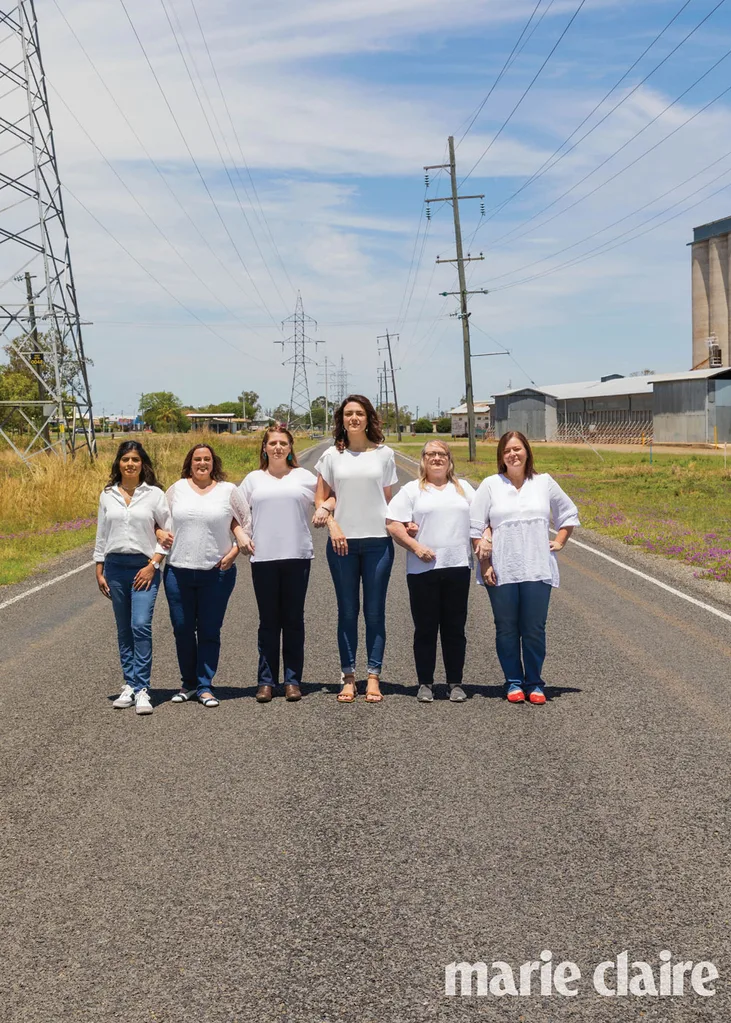
When Border Force officers forcibly removed the Murugappan family from their home on Rainbow Street in the rural Queensland town of Biloela, they unknowingly lit a fuse. Because when the community awoke that morning to find the family gone, they were horrified and instantly spurred into action, holding a vigil and then launching a campaign to bring the family #hometobilo. “That they would tear a family away like that, that was the start of people going, well, ‘What if that had happened to our family?’” explains campaign spokesperson Angela Fredericks.
From a petition of 98,000 signatures, the movement has grown into a powerful PR strategy encompassing multiple social-media accounts, high-profile news coverage and a crowdfunding campaign raising almost $500,000 for legal fees. And all coordinated by a group of women united by their mutual love of the family and their determination to hold the government to account on its treatment of refugees. “It’s just incredible seeing how women can network,” says Fredericks, a social worker who speaks to mother-of-two Priya via FaceTime “most days” and always keeps a photo of the Murugappan family with her. “I’ve watched these amazing women put aside any political differences, any differences of opinions and backgrounds, to come together. That’s something that’s truly amazed me, and I’ve been so grateful to be a part of that.”
In September, the women successfully campaigned for the government to issue the family a three-month bridging visa, allowing them to stay in Australia. But their fight to bring them #hometobilo is far from over. “We would love to have them home for Christmas,” Fredericks says. “To actually give them that peace of mind would be the best gift we could possibly ask for.”
Ash Barty
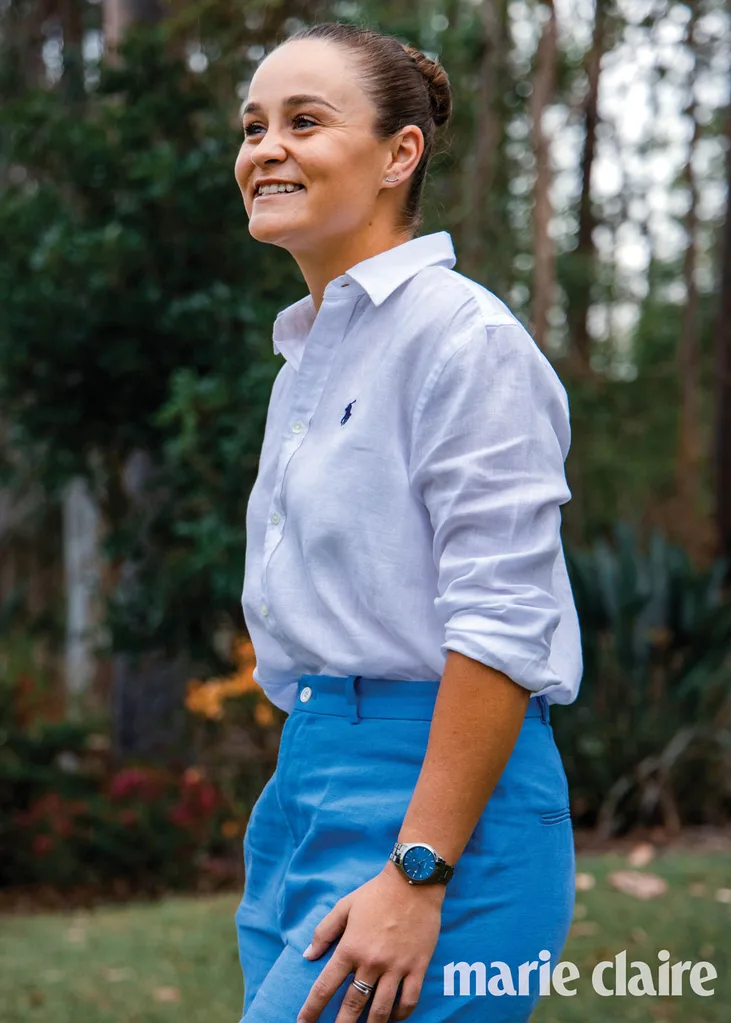
It was the triumph of goosebump-inducing proportions: Ash Barty winning Wimbledon on the 50th anniversary of her mentor Evonne Goolagong Cawley’s first Wimbledon title, on a date that coincided with NAIDOC week. And five months on, even the tennis great herself is still grappling with the overwhelming reality of conquering her “ultimate” dream. “It felt surreal then and still does to be honest,” she tells marie claire. “It was my dream to win Wimbledon for such a long time, I still can’t believe I’ve actually done it.”
In a scalloped-hem tennis skirt inspired by the outfit Goolagong Cawley wore when she won Wimbledon in 1971, Barty took out game, set and match against Karolina Pliskova with cool confidence, launching the nation into an ecstatic Barty party and cementing her status as a sporting icon alongside her predecessor. Their connection is one that is poignant and powerful. “Knowing I have Evonne’s support and encouragement as a friend and as a mentor is something I value very much,” says Barty. “She paved the way for young girls like me and showed Indigenous boys and girls that they were capable of anything.”
And while the 25-year-old Queenslander might describe her momentous victory as the “stars aligning”, her achievement is likely to deliver more magic for other aspiring young hopefuls. Barty’s advice to them? “Believe in yourself and chase your dreams – you are capable of anything!”
This story originally appeared in the December issue of marie claire Australia.
